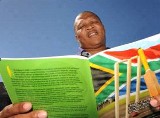
Stellenbosch University is taking steps to promote and embrace Xhosa, along with other African languages, via sports terminology booklets.
The two recently released trilingual sports glossary booklets – a sequel to a soccer-terms dictionary during the 2010 World Cup – were published by the university’s Language Centre for IsiXhosa Unit.
They include isiXhosa, English and Afrikaans terminology, and form part of the university’s bid to entice sports lovers by providing sports terms in the vernacular.
“The books form part of a special project to develop sports terminology,” uni- versity spokesman Siyavuya Madikane explained.
Pumlani Sibula, head of the IsiXhosa Unit and co-author of the latest booklet, said they wanted people to view their home languages, particularly isiXhosa, as “cool”.
“This is the university’s bid to promote not only isiXhosa, but pride in African folklore.”
Sibula, who was solely responsible for the World Cup booklet, believes the timing will help change people’s attitudes towards the language.
“Fittingly, the rugby and cricket seasons are under way in tandem, and we have produced these books with perfect timing, much like we did the soccer booklet”
Sibula expressed concern that “black people don’t speak their language with pride, and it irks me”.
“We’re virtually challenging isiXhosa speakers. The language’s survival needs commitment from them, and what better way to pass on our message than through sport?”
They had decided on the isiXhosa, English and Afrikaans combination because they were the languages mostly widely spoken in the Western Cape.
“In the past the university has often been synonymous with Afrikaans, and viewed as an apartheid institution. So this is our way of reaching out to the community,” he said.
Sibula waxed lyrical about the books and the community impact they hoped to see.
“I’m excited about being given the opportunity to be involved in a scheme that looks to stimulate speakers of the language to be enticed once again,” he said.
Highlighting the challenges of penning books of this kind, the isiXhosa fanatic said it took about a year to finish them.
“The problem is language can be culture-specific, making it difficult to translate. And isiXhosa is not exempt from this.
“The history of isiXhosa literature isn’t old. We used transliteration because isiXhosa lacks terminology, while we also took definitions and captured only the core items in those definitions.”
Fresh from a linguists’ conference in Botswana, aimed at “promoting African languages”, Professor Leon de Stadler, the university’s Language Centre director, said people did not appreciate the importance of African languages.
“We decided to do sports terminology because sport is spoken about casually.”
Photo: Leon Lestrade
Story by: SOYISO MALITI
Source: Weekend Argus
